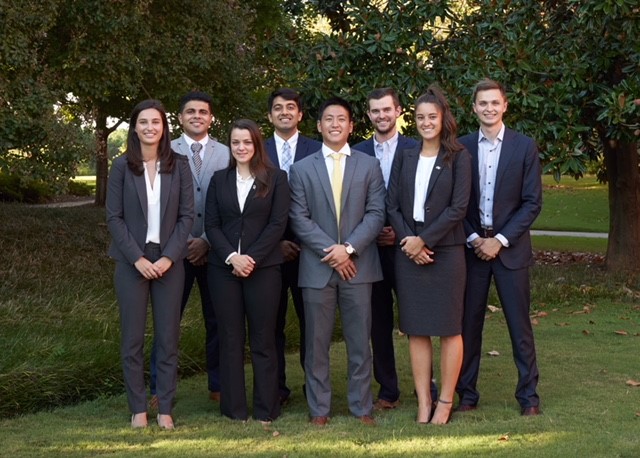Serve-Learn-Sustain supports a number of capstone projects every semester. This document provides some general guidelines about these projects. We aim to have affiliated projects in every school and we’re eager to collaborate with project teams! If you have a particular project in mind that you’d like to discuss – or if you would like SLS to help find you a project related to its theme, “creating sustainable communities” – please make an appointment to meet with us. For a sample project, please take a look at the Team Highlight below, Fall 2018. For additional examples, see the table at the bottom of this page, and take a look at this document, which provides further details on each of the five capstone programs with which SLS collaborates.
Team Highlight ISyE/SLS Fall 2018

Additional Information About Partnering with Capstone Teams
This ISYE project team worked with SLS and Second Helpings Atlanta (SHA), a non-profit organization that picks up unwanted food from donors and delivers it to partners, who in turn distribute the food locally to those in need. The goal of this project was to optimize the organization’s delivery network to handle current capacity, and provide a model for sustainable growth. Students working on this team were supported by SLS in using their unique disciplinary training to help create sustainable communities and engaged with SLS's priority issue areas (such as Community Health and the UN Sustainable Development Goals). Using routing techniques, the team analyzed SHA’s delivery network to maximize volunteer drivers’ time. Ultimately this project will provide SHA with qualitative insights as it continues to fight food insecurity in Metro Atlanta. This team worked with Dr. Michael Elliot and Dr. Darcy Mullen as Subject Matter Experts. These opportunities in cost reduction, delivery network optimization, strategic growth opportunities, and food waste reduction will help transform SHA into a data-driven organization with the capabilities to expand its operations. By collecting more food, wasting less of it, and best utilizing financial and volunteer resources, SHA will move forward in its mission to use “food rescue” for fighting food insecurity. ISyE students on this team drew on the key skills in their discipline and became more able to connect their academic and professional expertise to issues of equity and community health.
Team Members: Katie Pittelkow, Carson Hooper, Caroline Price, Benedict Spalding, David Zheng, Nihar Ullal, Neel Patil, Andrew Humphrey
Second Helpings Mentors: Myron Smith, Carlos Diaz (LEAD), Joe Labriola
GT Subject Matter Expert: Michael Elliot, School of City and Regional Planning
ISyE Advisor: Dr. Stephen Hackman; Examiner: John Van de Vate
Additional Guidance Regarding Capstone Projects and SLS Funds
| Department | Amount Provided to Partner | Project Duration | Example |
|---|---|---|---|
| Mechanical Engineering | SLS covers the fee charged by the department | 1 semester | ME students built the prototype for a composter for small and medium-sized organic farms for a local, grassroots farm and food network. Partner: Atlanta Food and Farm |
| Industrial and Systems Engineering | $500 per semester: SLS typically compensatesISYE nonprofit and community partners for one semester of work; however, additional funding is provided for the "pre-design" semester, if the partner's contribution was substantial during the proposal phase | 1 or 2 semesters | ISYE students redesigned the pickup and delivery system for an Atlanta-based food rescue organization. Partner: Second Helpings |
| Computer Science | $500 per semester | 2 semesters | CS students partners with a sustainable communities organization and designed an app to help senior home owners conduct energy audits of their homes. Partner: Center for Sustainable Communities |
| Civil and Environmental Engineering | $500 per semester | 1 semester | CEE students worked with a grassroots organization focused on watershed advocacy, health, and equity to site trash traps along a local waterway. Partner: West Atlanta Watershed Alliance |